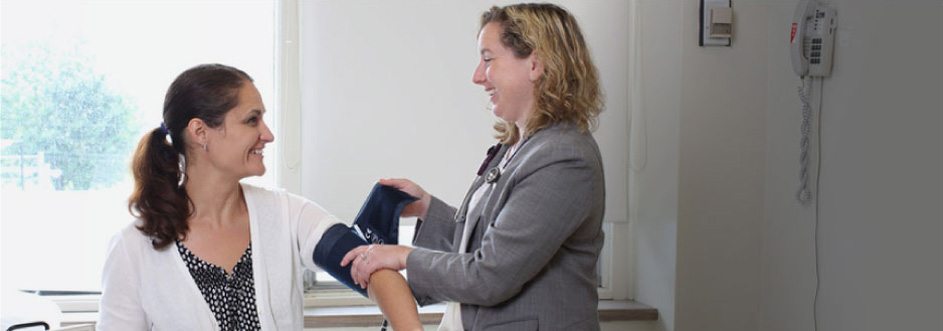Researchers Award Something to Sneeze At
Introduction. When a crowd gathers in one particular room at Kingston General Hospital, it’s not long before sneezing and sniffling can be heard. The room on Connell 3, which many years ago was the location of the hospital’s cafeteria, is now home to 120 blue plastic chairs lined neatly in rows. At the front of the room are about a dozen fans, which, when switched on, move air and allergens around the room. Other medical and air-quality measuring equipment is set up as well. And when Dr. Anne Ellis and her staff release pollen into the room, their research begins.
It’s the Environmental Exposure Unit (EEU), and the data collected there from allergy patients is used in many of Ellis’s research projects looking to improve the lives of allergy sufferers. “Everyone in the room is getting exposed to the exact same amount of pollen as everyone else,” Ellis said in an interview on Monday. “If the medication is going to work for allergies, you know for sure it’s going to work in here because there’s no chance they won’t be exposed to pollen, for example.” The sniffling and sneezing happens after just a few minutes of exposure to the allergen. “That’s the only way you can evaluate whether or not the new anti-allergic medication is working,” Ellis said. In a closed-off room, volunteers are used in dust mite research, another one of her research projects.
Awarded Research. For that research and other projects, Ellis and her team have received the 2016-17 the Mihran and Mary Basmajian Award for Excellence in Biomedical/Health Research. Ellis said she wasn’t sure which of her three current projects earned the award, “which I’m very honoured to receive,” she said. The Basmajian award was established in 1973-74 by Dr. John Basmajian, former head of the department of anatomy at Queen’s University, in honour of his parents. The award is given to a full-time member or members of the faculty of health sciences with a maximum of eight years of independent research experience and judged to have made the most meritorious contributions to health research during the previous year or several years.
Ellis, an associate professor in the department of medicine at Queen’s, chair of the division of allergy and immunology in the department of medicine and the director of the EEU, recently worked on a large study involving grass allergies. “It had the potential to allow people to get good relief of their symptoms of grass allergies or hay fever,” she said. The study found that people reacted favourably to the tested medication to eight injections over 14 weeks, “rather than weekly injections for four to six months, then monthly injections thereafter.” The drug was also safer to use with a low chance of side effects as compared to typical allergy shots.
Ellis said clinical trials develop lots of revenue for Queen’s and the hospital. Sponsors of studies, such as drug companies, pay for the study and cover all costs, including staff time. She also runs the Kingston Allergy Birth Cohort. Between 2011 and 2013, 400 mother-child pairs volunteered for the study and donated blood when the children were born at KGH. Ellis banks the blood samples in her laboratory. “We’ve been following those children forward in time looking for children who’ve developed an allergy and evaluating was there anything present at birth that we could have used to predict if these kids would go on to have allergies,” she said.
Ellis has also received funding from the Ontario Lung Association to study the effects of indoor air fresheners on children. Ellis said the use of air fresheners was related to respiratory issues in some children. She said those types of scented products can trigger symptoms for people with asthma or respiratory disease. “But it hadn’t, surprisingly, been shown in children who hadn’t yet developed asthma, so we’re learning a lot about the developmental origins of allergy and asthma through this cohort,” Ellis said. She also runs regular allergy and immunology clinics out of Hotel Dieu Hospital, providing clinical assessments on allergic rhinitis (hay fever), asthma, food allergy and anaphylaxis, drug allergy, stinging insect allergy, urticaria (hives) and eczema, in addition to immunodeficiency and other immune disorders.
Ellis shares the award with her full-time staff of five and countless graduate and undergraduate students who have participated in the research. “We’ve got a very efficient team who we couldn’t go anything without them,” she said. There’s a $5,000 cash award to be put towards research costs, as well as a bronze medal and inscribed silver plate. There will be an awards dinner in the fall to formally recognize Ellis and her team.
A lot of people have allergies, Ellis said. “Up to 40 per cent of the Canadian population will experience one allergic condition at one point in their lives,” she said. Allergies bring a financial burden as well, she said. “Days lost due to work, school absences, money spent on over-the-counter medications, that sort of thing, so we know it’s got a huge direct and indirect cost.” There’s not a high mortality rate for allergies, but a high morbidity rate, she said. She explained morbidity as “things that don’t kill you but make you sick.” “It’s important to find treatment for these conditions,” Ellis said.
